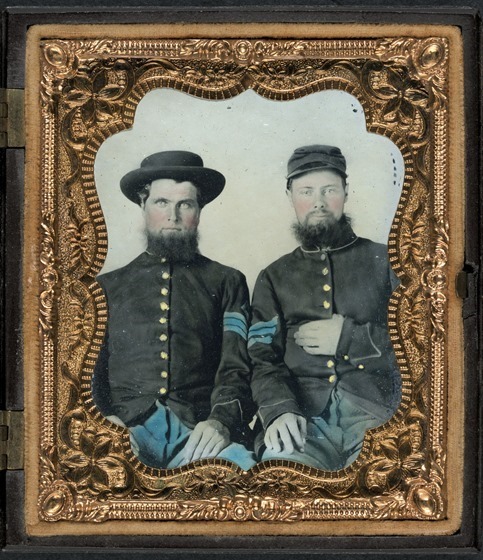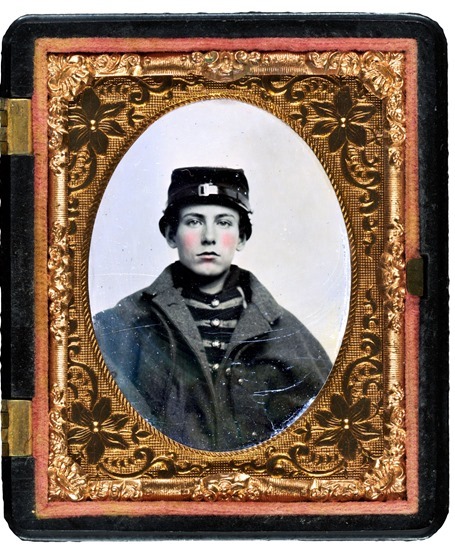
Two unidentified soldiers in Union sergeants’ uniforms
__________
Sixth-plate ambrotype, hand-colored ; 9.6 x 3.4 cm (case)
Liljenquist Family Collection of Civil War Photographs; Ambrotype/Tintype photograph filing series; Library of Congress Prints and Photographs Division.
Record page for image is here.
__________
 Note – This image has been digitally adjusted for one or more of the following:
Note – This image has been digitally adjusted for one or more of the following:
- fade correction,
- color, contrast, and/or saturation enhancement
- selected spot and/or scratch removal
- cropped for composition and/or to accentuate subject matter
- straighten image
Civil War Portrait 075
by John Beauchamp Jones
OCTOBER 27TH.—Nothing from the North or West to-day. But Beauregard telegraphs that the enemy’s batteries and monitors opened this morning heavily on his forts and batteries, but, as yet, there were no casualties.
The Commissary-General to-day, in a communication to the department, relating to the necessity of impressment to subsist our armies, says “the armies in Virginia muster 150,000 men.” If this be so, then let Meade come! It may be possible that instead of exaggerating, a policy may have been adopted calculated to conceal the actual strength of armies.
Nevertheless, it is understood that one of the cabinet is offering his estates, lands, and negroes for sale. Will he convert the money into European funds? If so, he should not let it be known, else it will engender the terrible idea that our affairs are in a desperate condition. The operations of the next thirty days may be decisive of our fate. Hundreds of thousands of Southern men have yet to die before subjugation can be effected; and quite that number of invaders must fall to accomplish it!
October 27th, 1863.—We went to the salt works today and, though I am tired and dirty and have no good place to write, I am going to try to tell you about it.
A year ago salt began to get scarce but the people only had to economize in its use, but soon there was no salt and then Father got Cousin Joe Bradford to come down from Georgia and take charge of some salt works he was having installed on the coast. He had plenty of hands from the plantation but they had to have an intelligent head and then, too, it is a rather dangerous place to work, for the Yankee gunboats can get very near the coast and they may try shelling the works.
Though they have been in operation quite awhile this is my first visit. Father brought us with him and we will stay three days, so he can see just how they are getting on. We are to sleep in a tent, on a ticking filled with pine straw. It will be a novel experience.
I am so interested in seeing the salt made from the water. The great big sugar kettles are filled full of water and fires made beneath the kettles. They are a long time heating up and then they boil merrily. Ben and Tup and Sam keep the fires going, for they must not cool down the least little bit. A white foam comes at first and then the dirtiest scum you ever saw bubbles and dances over the surface, as the water boils away it seems to get thicker and thicker, at last only a wet mass of what looks like sand remains. This they spread on smooth oaken planks to dry. In bright weather the sun does the rest of the work of evaporation, but if the weather is bad fires are made just outside of a long, low shelter, where the planks are placed on blocks of wood. The shelter keeps off the rain and the fires give out heat enough to carry on the evaporation. The salt finished in fair weather is much whiter and nicer in every way than that dried in bad weather, but this dark salt is used to salt meat or to pickle pork. I think it is fine of Father to do all this. It is very troublesome and it takes nine men to do the work, besides Cousin Joe’s time; and Father does not get any pay whatever for the salt he makes.
We expected to have a grand time swimming and fishing. We are both good swimmers, but Father and Cousin Joe will not allow us to go outside of this little cove. Yankee gun-boats have been sighted once lately and there is no knowing when the salt works may be attacked.
October 27.—A detachment of National troops, under the command of General William F. Smith, surprised and routed a large body of rebels at Brown’s Ferry, opening communication with Bridgeport—(Docs. 96, 210, and 211.)
—At Charleston, S. C., four monitors opened fire upon Fort Sumter, at a distance of one mile, and continued the bombardment until late in the afternoon. At eleven o’clock in the morning solid shot were thrown into the city of Charleston, one of which struck the building occupied by the Union Bank.
Dickson Station, Monday, Oct. 26. Long before reveille I was awake listening to heavy roar of artillery in the front, which at times was quite rapid. Can’t be more than three miles away. The 56th Illinois and 18th Wisconsin went out at midnight with orders to report to Osterhaus at 3 A. M. The firing gradually ceased but could be heard occasionally during the day. General order No. 63 from W. T. Sherman was read to us this morning at 9 A. M. A very able and just order for the government of troops on the march and in camp. Four of the furloughed men returned. Large forage trains sent out and returned plentifully laden with the good things of the Confederacy. Health and spirits of the boys very good and all is lively about camp.
Iuka, Miss., October 26, 1863.
Let your pocket ‘kerchief float out on the breeze, halloo a little and throw up your bonnet. It’s only a “march at 12 o’clock to-night” but that’s good enough. We’ve been here a week now, drawing clothing and making all kinds of preparations for a “forward,” and the blessed word has come at last. I don’t believe anybody enjoys anything better than I do marching. I feel as coltish all the time on a move as I used to, when after a long week of those short winter days at school, with just time enough between the school hours and dark to cut the next day’s wood (how I did work), Job Walker and I would plunge into those dear old Big Creek woods with our guns or skates, and make such a day of it that I would almost wish all time was cut up into Saturdays. I was on picket last night; full moon, splendid post, right on the old Iuka battle ground, where the fight was the hottest; the old clothes, straps, cartridge boxes and litter always found in such places, the scarred trees, and the mounds a little further up the road, marking the pits where lay the glorious dead, then a half dozen neatly marked single graves, showing the care of some company commander, all tempted me to commit some more poetry. You know I can. But I nobly resisted the temptation. There were no coons or owls. I wished for them. My picketing the last year has almost all been in swamps, and I have learned to love the concerts those innocent animals improvise. When I got in this morning found orders to be ready to move at 12 this p.m. We cross the Tennessee river, I suppose, near Eastport. This beats me all hollow. Can’t see the point, unless we’re moving to check some of Bragg’s flanking motions. Anything for a move. I put the profile of a fort here the other day under the direction of Sherman’s engineer, and the chief told me if I would like it he would have me detailed to assist him. Have had enough of staff duty and excused myself. The men are rapidly becoming more healthy. I have but one person sick now. Dorrance arrived here a few days since, and brought a splendid long letter from you. Have to go to work on some ordnance reports now.
Am half inclined to think that our big march is played out. Rather think now that we will stop at Eastport on the Tennessee river. Isn’t that heavy? Eight miles only and then go to guarding navigation on a river that’s a twin sister of Big Creek. Can’t tell though, one rumor says that we will go 128 miles beyond the river. These generals are positively getting so sharp that a man can’t tell one month ahead what they are going to do.
One of my men who was captured down near Panola, Miss., last April returned to the company for duty yesterday. Some Confederate soldiers captured him and some citizens offered them $10 to each captor for the privilege of hanging the d___d Yanks. They couldn’t make a bargain. Transferred five men to the invalid corps yesterday. Jacob J. Nicholson among them.
26th. Got out desk and Co. property to work. Trains reloaded and sent to the rear. Fear of an attack. Proposed to the boys the order for re-enlistment. Read some in “B. House.” Boys got some good apples and apple butter. Cloudy and quite cold. Contradictory news from the Army of the Potomac. Election news.
Monday, 26th—Everything is quiet. A thousand men are at work every day on the fortifications. The fortifications are being built on a small scale, but are built all around the edge of town so that a small force can hold the place. The cannon are arranged so that they can be turned in any direction.
Sunday, October 26.—Mrs. Harrison, the lady from Florida, has taken charge of the ward at the Springs. She had a pretty hard time at the beginning. The first day the rain poured into her room in torrents. She told me this as a joke, as she has determined not to complain. I think, like myself, she has something of the Mark Tapley spirit, and thinks, unless she has drawbacks, there will be no credit in staying in a hospital. A number of our patients have been sent down to the Springs, and Mrs. H. is paying them the most devoted attention.
To-day is Sunday, but we are too busy to think of going to church. Mrs. W. and myself are up at 4 o’clock every morning, preparing eggnog and toddies for the wounded; they are compelled to have them before eating. One of our patients, by the name of Davis, has had his arm amputated, and is doing well.

Unidentified young soldier in Union musician’s uniform and coat
__________
Ninth-plate ambrotype, hand-colored ; 7.6 x 6.5 cm (case)
Liljenquist Family Collection of Civil War Photographs; Ambrotype/Tintype photograph filing series; Library of Congress Prints and Photographs Division.
Record page for image is here.
__________
 Note – This image has been digitally adjusted for one or more of the following:
Note – This image has been digitally adjusted for one or more of the following:
- fade correction,
- color, contrast, and/or saturation enhancement
- selected spot and/or scratch removal
- cropped for composition and/or to accentuate subject matter
- straighten image
Civil War Portrait 074
 Note – This image has been digitally adjusted for one or more of the following:
Note – This image has been digitally adjusted for one or more of the following:











